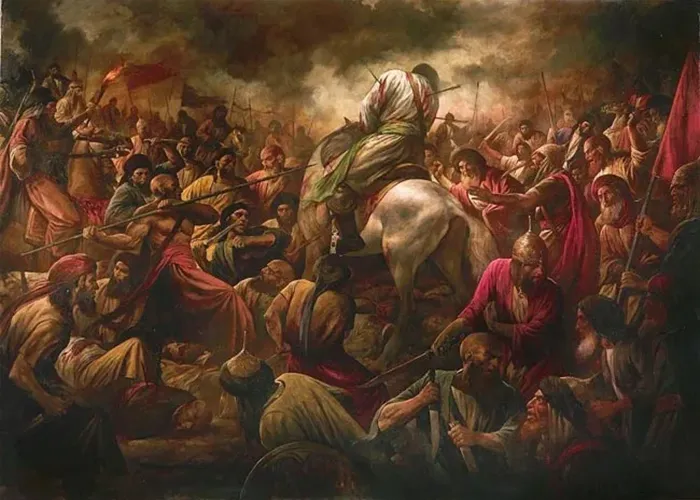Fatwa Panel of the Week – Volume02 Issue31
Rulings Related to the Place of Salaat:
Here are the rules related to the place of Salaat, according to the fatwas of the Grand Religious Authorities:
Grand Ayatollah Khamenei, Grand Ayatollah Sistani, and Grand Ayatollah Makarem Shirazi (may their eminence be preserved)
Conditions of the Place for the One Performing Prayer (1)
1. The place where the person prays must be permissible (mubāḥ), meaning it should not be usurped (ghasbī).
| Ayatollah Khamenei | Ayatollah Sistani | Ayatollah Makarem Shirazi |
| 1. Performing prayer on a usurped (ghasbī) carpet or bed, even if the ground beneath it is permissible (mubāḥ), renders the prayer invalid. Likewise, if a permissible carpet is spread over usurped land, praying on it is invalid.
2. If a person prays in a place and is unaware or has forgotten that it is usurped, the prayer is valid. 3. If someone knows a place is usurped but is unaware that praying in a usurped place invalidates the prayer, then the prayer performed there is invalid. 4. If a person shares ownership of a property with someone else, and the shares are not specifically divided, they cannot pray there without the consent of the other co-owner. 5. If the benefit of a property belongs to someone else—for example, it is rented to a tenant—then praying in that property without the tenant’s permission is invalid, even for the actual owner. |
1. Praying on usurped property (e.g. carpet or bed laid over usurped land) invalidates the prayer as an obligatory precaution—even if sitting underneath an actual roof or tent that is itself usurped is not problematic.
2. If a person unknowingly or forgetfully prays on usurped property and later realizes it, the prayer remains valid, unless they themselves were the usurper (in which case it is invalid by precaution) 3. If someone knows the place is usurped but does not know that praying there invalidates the prayer, and nonetheless prays there, the prayer is invalid by obligatory precaution 4. If a person co‑owns property but his share is not separately defined, he may not pray there without the explicit consent of the partner. Doing so invalidates the prayer by obligatory precaution. 5. If the benefit of a property belongs to someone else (e.g. a rented house), praying there without the permitted beneficiary’s permission renders the prayer void by precaution—even for the owner if the tenant is the one in possession. |
1. Same as Ayatollah Khamenei’s Fatwa.
2. Same as Ayatollah Khamenei’s Fatwa. 3. If someone knows a place is usurped but does not know that prayer there is invalid, and prays, the prayer is invalid—by precaution, they must repeat it. 4. Same as Ayatollah Khamenei’s Fatwa. 5. Same as Ayatollah Khamenei’s Fatwa. |
2. The Place Must Be Still – Stationary.
| 1. The place where the person prays must be such that they are able to perform the prayer with bodily stillness and composure. Therefore, praying in moving places such as a car, train, or airplane, or on certain spring beds, is not valid—unless due to time constraints or other reasons, one is compelled to pray in such a location.
2. It is obligatory for passengers using public transportation, if they fear the prayer time may lapse, to request the driver to stop. It is also obligatory for the driver to accept their request. If, for any reason, the driver does not stop, then the duty of the passengers is to perform the prayer while the vehicle is moving, observing the direction of the Qiblah, standing, bowing (rukūʿ), and prostration (sujūd) as much as possible. |
1. Prayer in a car, ship, train, etc. is permitted while it’s stationary. It is also permitted if the vehicle is moving, provided the movement does not prevent the person’s body from being steady—i.e. stillness for standing, bowing, and prostration must be possible.
2. There is no requirement for passengers to ask the driver to stop. Instead, if movement prevents normal prayer, one should delay until the vehicle stops if possible. But if waiting causes hardship and risks missing the prayer time, it becomes obligatory to pray while moving, making the best effort to fulfil basic conditions (face Qiblah within 90°, pray seated if needed) |
1. A prayer performed on a moving vehicle where it is impossible to perform the parts of prayer normally is invalid
· However, if the vehicle allows one to perform all parts of the prayer properly (standing, bowing, prostration) and the Qiblah direction remains constant, then praying in it is permissible (valid). 2. Same as Ayatollah Sistani’s Fatwa. |
3. The place must not be prohibited zone for stopping.
| 1. The place where one prays must not be a location where stopping is forbidden—such as somewhere placing one’s life in serious danger.
2. The location also must not be such that standing or sitting on it is prohibited, for example, a prayer rug or carpet that bears the name of God or Qur’anic verses in a form that stepping on it would be considered disrespectful. |
1. One must perform prayers in a place where he deems it probable that he will complete them. However, if one is confident that he will not be able to complete his prayers in a place on account of wind, rain, or there being a lot of people around and suchlike, he must perform prayers with the intention of rajāʾ; and if he happens to complete his prayer, it will be valid.
2. Performing prayers on something that is unlawful to stand or sit on – such as a place on a mat that has the name of Allah the Exalted written on it – is not correct in the event that it prevents one from establishing an intention to attain proximity to Allah (qaṣd al‑qurbah). |
1. One should perform prayer in a place where he is able to perform the obligatory parts of the prayer. Therefore, prayer is void in a place which the ceiling is so low that one may not stand properly, or there is not enough space for performing rukÙ‘ and sajdah.
2.It is befitting that as a matter of courtesy one should not offer prayer ahead of the graves of the holy Prophet (Ò) and the holy Imams (as). If it entails irreverence, it is haram and prayer is void as an obligatory precaution, otherwise, it is not void. |
news via inbox
Subscribe to the newsletter.




